If the idea was to garner AIADMK votes with or without the three faction leaders after the party broke ties with the NDA, it may not work after all, observes N Sathiya Moorthy.

It may sound apocryphal but the changing ways the youth in Dravidian Tamil Nadu greet one another may be indicative of their political preferences.
For a long time, it was 'machchi or brother-in-law, but when education introduced greater civility and they still wanted to stand out as a class, they switched over to 'Ji'.
At the time, they did not know the political implications of the call-sign as it was identified with the BJP and other Sangh Parivar outfits.
Possibly picking up the phrase from north Indian migrant labour in their midst, the Tamil youth found it to confer a certain dignity on whoever is thus addressed.
It could even be a mean person or a menial employee.
Better still it went well with the Dravidian socio-political concept of social justice and self-respect.
The 'Ji' term did not survive for long. That was because the youth found before long that it was a common or a mandatory term for mutual greetings in the Sangh Parivar organisations.
Then came 'Bro', a shortened form for 'Brother', which is as respectable as 'Ji', but did not have a political angle attached to it.
Better still, it reflected the mood of the '90s kids and those born afterwards, from among whom there emerged scores of engineers and MBAs and of course doctors, dentists and lawyers.
'Bro', they could relate to, instantaneously even when the other person is an absolute stranger.
This linguistic discourse (!), if it could be conferred that respectability, would not have mattered much in the normal circumstances.
But at election time when every political party and analyst is looking around for symptomatic representation of mutual address among the youth, those that are habituated to 'Ji' are taken for BJP supporters and sympathisers.
Likewise, those who have migrated or graduated to 'Bro' are definitely anti-BJP. Not many stick to the old phraseology 'machchi', but where they do, they too are anti-BJP.
Of course, all these changing trends are representative only of the Tamil youth's political mood.
But once anti-BJP, they may still be pro-DMK, pro-AIADMK or pro-NTK, the last one the pan-Tamil political party floated by actor-politician Seeman.
As for the large constituency of migrant labour from the northern states, especially the Hindi-belt or the cow-belt, it would be a mistake to see them all as 'BJP voters'.
They carry their village-level caste and clan-based politics into south India, whether it is Tamil Nadu or any other states in the region.
All of it assumes some significance ahead of the Lok Sabha polls, where a three-cornered contest is on cards.
Clearly, the BJP-NDA is there with a host of non-existent minor parties with hopes of at least two moderately successful sub-regional parties.
The Vanniar community strong Pattali Makkal Katchi has a confirmed five per cent vote-share, going by state-level figures.
In the 100-odd assembly segments where they have a presence, their vote-share swings from four to eight per cent.
The other one is the DMDK, the party founded by late actor-politician Vijayakanth.
Before his death, the party was a write-off, but the massive crowds that gathered at his funeral was beyond all expectations.
This has given a fresh hope to the party, now under his wife, Premalatha.
It is anybody's guess if those that gathered at the funeral were there to celebrate Vijaykanth's philanthropic nature when alive and acting, and if all of them could be considered the DMDK's loyal voters after his death.
At the peak, in the maiden poll outing, this one for the state assembly, the DMDK polled a respectable 8.38 per cent vote share.
It went marginally up, just above 10 per cent in the Lok Sabha polls of 2009, even when the party did not have, or support, any prime minister candidate.
The BJP polled 2 per cent and 2.3 per cent in the two elections but with a prime ministerial face.
Thanks to political immaturity fuelled by assumed self-importance and also utter lack of staying power over the medium term, the DMDK lost the race even before it had entered one in full form.
This has also been the case with all sub-regional parties in Tamil Nadu, including the PMK.

In this background, state BJP President K Annamalai recently attributing the restoration of traditional bull-fight Jallikattu in 2017 to Prime Minister Narendra Modi's leadership does not sit well with youth in their millions who gathered at multiple points across the state, later going down to the district and taluk-level during the historic Jallikattu protests of January 2017.
It remains to be seen how then AIADMK chief minister O Panneerselvam, who claimed ownership for the victory, intends reacting -- though for now his camp has reiterated that they backed Modi for PM.
Indications are that alliance talks between the BJP and the OPS faction (which neither has a name or a flag or a poll symbol) has hit a road block, though not insurmountable.
It still remains unclear if the BJP-NDA would also have two other AIADMK factions led by Jayalalithaa's live-in aide Sasikala Natarajan and the latter's nephew T T V Dhinakaran.
Campaigning for the BJP at official functions in the state last week, Modi praised Jayalalithaa and her political-mentor M G Ramachandran as 'able administrators'.
If the idea was to garner AIADMK votes with or without the three faction leaders after the party under former chief minister Edappadi K Palaniswami broke ties with the NDA, it may not work after all.
One, traditional AIADMK voters, who have been around since the days of MGR -- he died in 1987 -- they still vote only for the 'Two Leaves' symbol.
Unless EPS loses the symbol, those votes are his for sure. New-generation AIADMK voters are those that forced EPS to snap ties with the BJP, on Hindutva issues.
As the results of election 2019 showed, they had en masse voted for the rival DMK alliance in Lok Sabha constituency after constituency.
In the previous 2014 polls, Jaya as AIADMK chief minister had won 37 of 39 Lok Sabha seats with her clarion call, 'Modi-ya, indha Lady-ya?' Both 2014 and 2019 were votes against Modi, full-stop.

By praising MGR and Jaya just now, all that Modi could have achieved is to drive doubts into the minds of traditional AIADMK voters who had cross-voted for the DMK combine in 2019, if the two may end up working together, post-poll, if required.
Such doubts would only work out to the advantage of the rival DMK alliance.
It is another matter that the AIADMK and EPS are fixated only on the assembly polls in 2026, where they hope to benefit vastly from the 'anti-incumbency' that has already set in against the DMK.
They continue to feel that it would help them only if they stop playing second fiddle to the BJP.
In his rejoinder to Modi's repeated charge that the DMK was corrupt, party Treasurer and parliamentary group leader T R Baalu has asked him, how then did the PM praise Jayalalithaa when she died without facing the verdict of the Supreme Court that found all her co-accused guilty in a corruption case staging against her name.
As for the PM's claim that there won't be any DMK after the polls, the wag asks if it meant that the state government would be dismissed if Modi returned to power.
As he points out, the DMK has survived violent electoral swings through past decades.
That it was only an election speech and by directing his criticism at the DMK, Modi was only trying to project the BJP as the 'real alternative' to the ruling party -- which status now the AIADMK alone enjoys in the voter's mind.

If it was Hindutva for the 'Bro' voters the last time round, they are now staring at the other side of the Dravidian coin -- which is centred on federal principles, social justice and language.
Between them, the Centre as an institution and Governor R N Ravi as an individual -- most of his criticism against the state government and the Dravidian polity has had no gubernatorial sanction under the Constitutional scheme -- have ensured that the flames of the Jallikattu protests were not put out completely.
They are not Dravidian voters per se, but like the Dravidian polity, particularly the DMK parent, they share similar sentiments on issues.
They are also the ones who vote for other pan-Tamil parties like the NTK, PMK and even DMDK -- but only the former now qualifies to be one.
They are god-fearing and are also temple-worshippers.
But they are not amused by the use of the 'Sanatana card', to paint the Dravidian polity black across the country, purely for politico-electoral reasons.
According to them, the way DMK Minister Udayanidhi Stalin went about it was just a side-show, which would have gone unnoticed but for the BJP raking it up at the national level, from Amit Shah downwards.
Over and above it all, this generation, too, is peeved at the BJP's kind of horse-trading elsewhere across the country.
The three major political splits were ideological or personality-driven in the state -- namely, the Communist Party of India (1964), the Congress (1969) and the ruling DMK (1972).
Those that followed within the AIADMK in 1988 (post-MGR) and 2017 (post-Jaya) are seen as shameful episodes, over which every Tamil youth hangs his head in shame.
To them, the BJP is a no-no also for this reason -- preaching ethics and practising the unethical.
Their choice now can be NTK, DMK or the AIADMK, not necessary in that order.
If Modi's message, intended or otherwise, that post-poll EPS would shake hands with him goes down the line, they could vote for the DMK combine -- without working for the alliance at the grass-roots level. Else, their votes will be split.
N Sathiya Moorthy, veteran journalist and author, is a Chennai-based policy analyst and political commentator.
Feature Presentation: Aslam Hunani/Rediff.com
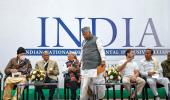

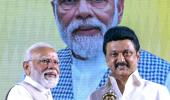
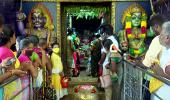




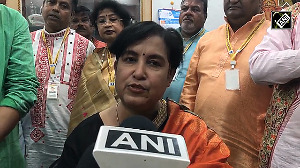
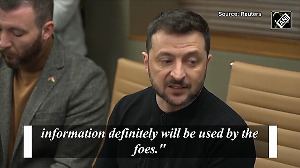
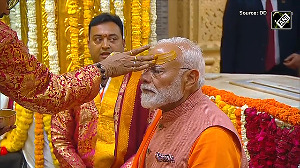
 © 2025
© 2025